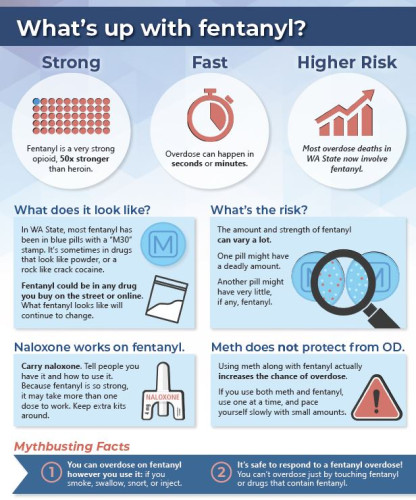From the Open-Publishing Calendar
From the Open-Publishing Newswire
Indybay Feature
Cops Say They're Being Poisoned by Fentanyl. Experts Say The Risk is 'Extremely Low'
While cops hype and exaggerate the dangers fentanyl, even falsely claiming to have been poisoned by fentanyl while responding to a call. The real risk of being poisoned from limited fentanyl contact is very low.
Many police officers clearly believe fentanyl poses a significant risk. The synthetic opioid is powerful, killing tens of thousands of Americans every year. But medical experts say it's difficult to get fentanyl into the body. That's why people addicted to the drug often smoke it or inject it using needles. "Fentanyl does not pass through the skin efficiently or well.". "The dry powder form that's encountered in street drugs is not going to pass through the skin in any meaningful way." Researchers also say the risk of fentanyl powder poisoning someone when it's airborne like dust is extremely low.
NPR also contacted numerous other law enforcement and government agencies, as well as researchers around the U.S. They couldn't find a single case of a police officer who reported being poisoned by fentanyl or overdosing after encountering the street drug that was confirmed by toxicology reports.
https://www.npr.org/2023/05/16/1175726650/fentanyl-police-overdose-misinformation
While there’s no debate that fentanyl is a dangerous and deadly drug on the street, there is a lot of debate over whether a first responder can actually overdose from exposure.
“Fentanyl is a problem for people who are using drugs, it’s not a problem for bystanders,” said Ryan Marino, M.D. “It’s not something that can just get into your system without you knowing it.”
Dr. Marino is an emergency physician, a medical toxicologist and an addiction specialist with Case Western University in Ohio. He’s also an outspoken critic of law enforcement agencies sharing what he calls false information about the drug and accidental exposure.
Drug Overdose From Limited Fentanyl Contact Not Possible, Experts Say
https://www.usatoday.com/story/news/factcheck/2021/08/25/fact-check-fentanyl-overdose-limited-contact-not-possible/8125134002/
While fentanyl can be potent in small amounts depending on what other substances it's mixed with, brief secondhand exposure to the opioid cannot cause an overdose, experts say.
"The only way to overdose is from injecting, snorting or some other way of ingesting it. You cannot overdose from secondhand contact," Dr. Ryan Marino, medical director of toxicology and addiction medicine at University Hospitals in Cleveland, told The New York Times.
Dr. Lewis Nelson, director of the Division of Medical Toxicology at Rutgers New Jersey Medical School, agreed, telling Reuters fentanyl overdose was possible "with large dermal exposure ... for a prolonged time." But he said even the pharmaceutical fentanyl patch, which is designed to be absorbed through the skin, "takes 12-16 hours before a significant blood fentanyl concentration is reached."
Viral Video of San Diego Deputy's Fentanyl Exposure Raises Questions
Expressed doubts about the scenario. "You can't just touch fentanyl and overdose"
https://www.nbcnews.com/news/us-news/viral-video-san-diego-deputy-s-fentanyl-exposure-raises-questions-n1276248
Academics at University of California, San Diego and North Carolina's nonprofit RTI (Research Triangle International) published a paper in June in the peer-reviewed International Journal of Drug Policy that concluded there are no confirmed touch-based cases of first responder fentanyl overdoses, even when naloxone was used to revive them.
NPR also contacted numerous other law enforcement and government agencies, as well as researchers around the U.S. They couldn't find a single case of a police officer who reported being poisoned by fentanyl or overdosing after encountering the street drug that was confirmed by toxicology reports.
https://www.npr.org/2023/05/16/1175726650/fentanyl-police-overdose-misinformation
While there’s no debate that fentanyl is a dangerous and deadly drug on the street, there is a lot of debate over whether a first responder can actually overdose from exposure.
“Fentanyl is a problem for people who are using drugs, it’s not a problem for bystanders,” said Ryan Marino, M.D. “It’s not something that can just get into your system without you knowing it.”
Dr. Marino is an emergency physician, a medical toxicologist and an addiction specialist with Case Western University in Ohio. He’s also an outspoken critic of law enforcement agencies sharing what he calls false information about the drug and accidental exposure.
Drug Overdose From Limited Fentanyl Contact Not Possible, Experts Say
https://www.usatoday.com/story/news/factcheck/2021/08/25/fact-check-fentanyl-overdose-limited-contact-not-possible/8125134002/
While fentanyl can be potent in small amounts depending on what other substances it's mixed with, brief secondhand exposure to the opioid cannot cause an overdose, experts say.
"The only way to overdose is from injecting, snorting or some other way of ingesting it. You cannot overdose from secondhand contact," Dr. Ryan Marino, medical director of toxicology and addiction medicine at University Hospitals in Cleveland, told The New York Times.
Dr. Lewis Nelson, director of the Division of Medical Toxicology at Rutgers New Jersey Medical School, agreed, telling Reuters fentanyl overdose was possible "with large dermal exposure ... for a prolonged time." But he said even the pharmaceutical fentanyl patch, which is designed to be absorbed through the skin, "takes 12-16 hours before a significant blood fentanyl concentration is reached."
Viral Video of San Diego Deputy's Fentanyl Exposure Raises Questions
Expressed doubts about the scenario. "You can't just touch fentanyl and overdose"
https://www.nbcnews.com/news/us-news/viral-video-san-diego-deputy-s-fentanyl-exposure-raises-questions-n1276248
Academics at University of California, San Diego and North Carolina's nonprofit RTI (Research Triangle International) published a paper in June in the peer-reviewed International Journal of Drug Policy that concluded there are no confirmed touch-based cases of first responder fentanyl overdoses, even when naloxone was used to revive them.
For more information:
https://www.facebook.com/groups/pnwstreetm...
Add Your Comments
We are 100% volunteer and depend on your participation to sustain our efforts!
Get Involved
If you'd like to help with maintaining or developing the website, contact us.
Publish
Publish your stories and upcoming events on Indybay.
Topics
More
Search Indybay's Archives
Advanced Search
►
▼
IMC Network



